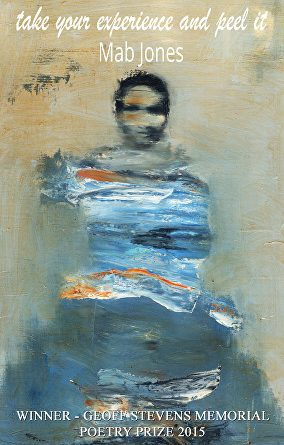take your experience and peel it by Mab Jones
– Reviewed by Angela Topping –
Many of Mab Jones’ poems in take your experience and peel it are voiced in the first person, and it’s good to see someone who is not afraid of ‘I’, though the speaker and the poet are not necessarily the same. In some cases, it is obviously not the poet speaking – ‘I was a boy’ is about Ernest Wilson, The Cardiff airship pioneer – but I always think poets write in the voice of others with whom they feel an affinity, and wonder what the links are. In this particular poem, there’s a Welsh connection, but the imagery of flight, of trial and invention, also suits Jones’ way of working as a poet.
She also writes in the third person about people who appeal to her: a cast of characters drawn from myth and story. ‘Aqueous’ is about the wild swimmer and artist, Natasha Brooks, but in Jones’ hands, the poem is a meditation on what a woman is: ‘identity itself unfastened, shimmied out of / like a skirt’. Note the music of the consonants, for Jones is a poet with a good ear. ‘Selene’ also reflects on womanhood, the goddess of the moon teaching us to accept our body’s changes, from thin to fat, ‘our bodies which are fulsome and then not’, and to accept the different phases of our lives and form.
Bodies interest Jones; many of these poems celebrate their sensuality, such as ‘In Praise of Bodies, Celestial and Otherwise’ and ‘These Bones’, in which Jones imagines what the people buried in Cathays, Cardiff, were like when they were alive. She puts flesh on their bones, as it were. ‘What She Made’ is a poem of celebration, of breast milk, of the mother’s bond with her child, until the cruel reversal of the second stanza, the grown-up soured by the mother’s undoing of him, through unnurturing and selfishness, ‘that doorway / shaped like smoke’.
‘Blodeuwedd’, the woman made from flowers from Welsh myth, begins with a beautiful woman:
Naked one could see her skin
was composed of soft pink roses,
velvet-smooth and blushing…
In her allegory, Jones shows us what can happen to such a woman:
A thousand flower mouths open
so many orifices waiting, asking
to be entered by tongues and fingers,
Why is this supposedly the perfect woman, even though she has no sex organs? Because she does not resist. ‘She stood rooted to the spot’, in a brilliant play on words, silent because she has no mouth. Jones’ comment on how men treat women is biting, yet she communicates this in a poem as beautiful as a garden, full of perfume and colour.
Jones includes several love poems in the collection, as a running theme. However, they are not cosy: the love object seems broken and wounded. These poems are often about the power of love, or at least the desire for redemption. Poems like ‘Rainbow’ are full of rich imagery but include elements of violence:
For you, I’d kill a rainbow. Set treasure
in a field, and wait. And when the creaturecame to feast, I’d let the trap snap shut;
work to drag that thrashing arch back home.
The impossibility of this murder implies that fixing the loved one is also impossible. ‘Paper Man’ shows another side to this love, one in which the lover has eventually given up. It begins: ‘At first, paper man / I admired your cutting edge’ but ends ‘you still left me in cuts all over / while I in turn have changed to other / things, Water, Wood. / Finally to stone.’ The poem is full of hurt imagery tucked inside a solid block of short lines and a tight narrative. The speaker has withstood many things before becoming immune to the pain inflicted by the paper man, strengthened perhaps by the experience. There are also love poems which are tender and sensual, such as ‘When’, ‘Sustenance’ and ‘Words’.
In many ways, this collection is about transformation. In the final poem, bulbs emerge from their underground world to sing out ‘even in the dark, we knew / we knew what we were’. This a poem of defiance, of self-knowledge, and it’s a fitting resting place.
Mab Jones is a poet of detail, of concrete objects pulling their weight. Occasionally surreal, she has originality of thought and imagination. Technically, she is skilful. Indigo Dreams have created a quality slim volume with a striking, fitting cover, and the poems within do not disappoint. I look forward to reading more of Mab Jones’ work in future; this was my first taste of her lush imagery and deft forms.





